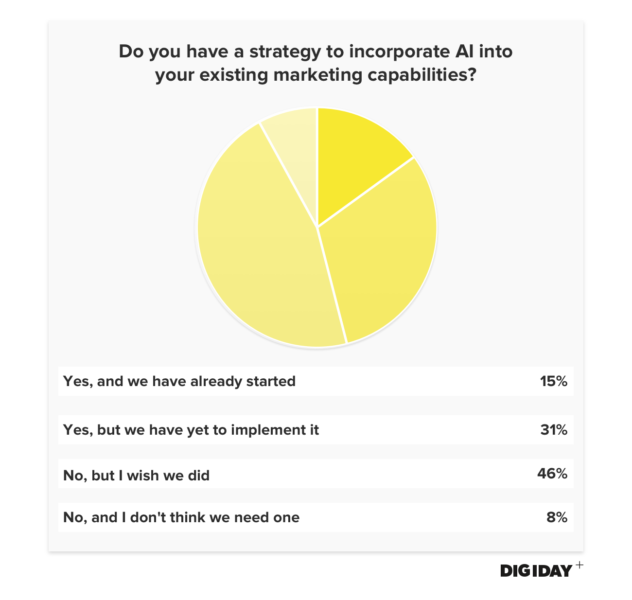Digiday Research: Less than 50 percent of brands are using AI for marketing
This research is based on unique data collected from our proprietary audience of publisher, agency, brand and tech insiders. It’s available to Digiday+ members. More from the series →
Digiday’s “Research in brief” is our newest research installment designed to give you quick, easy and digestible facts to make better decisions and win arguments around the office. They are based on Digiday’s proprietary surveys of industry leaders, executives and doers. See our earlier research on the state of the agency world here.
Globalization coupled with the rise of e-commerce has increasingly pitted brands against one another. Due to this increased competition, brands are scouring for the latest technology or strategy that can provide a competitive edge. One such area they have explored is incorporating artificial intelligence into their marketing strategies. At the Digiday Marketing Summit in the Bahamas, we surveyed 30 marketing executives to better understand their approach to artificial intelligence.
Only 15 percent of brands have applied AI to their marketing strategies to date, but those brands are benefiting. Retailer Adore Me boosted revenues by 15 percent when AI was used to strengthen their audience segmentation efforts and shift customer messaging from mainly email to texts, in-app messages and Facebook ads. Dole and Gallery Furniture each used artificial intelligence marketing platform Albert to optimize marketing campaigns in real time and saw significant lifts. Unilever, Toyota and Campbell’s Soup are just a few brands that count on IBM’s Watson to create personalized advertising experiences for their consumers.
 Over half of all brands haven’t incorporated any AI into their marketing efforts. Eric Brassard, founder of AI recommendation company Propulse Analytics and a former Saks Fifth Avenue executive, said brands’ hesitation to share their proprietary data could be a factor.
Over half of all brands haven’t incorporated any AI into their marketing efforts. Eric Brassard, founder of AI recommendation company Propulse Analytics and a former Saks Fifth Avenue executive, said brands’ hesitation to share their proprietary data could be a factor.
Forty-six percent of brands wish their companies had an AI strategy. But those not using AI should remind themselves that simply implementing AI doesn’t guarantee success. Jeremy Waite, global leader of CMO Programs at IBM, cautioned brands against rushing prematurely into AI because the technology faces major operational hurdles.
More in Marketing

YouTube’s upmarket TV push still runs on mid-funnel DNA
YouTube is balancing wanting to be premium TV, the short-form powerhouse and a creator economy engine all at once.

Digiday ranks the best and worst Super Bowl 2026 ads
Now that the dust has settled, it’s time to reflect on the best and worst commercials from Super Bowl 2026.

In the age of AI content, The Super Bowl felt old-fashioned
The Super Bowl is one of the last places where brands are reminded that cultural likeness is easy but shared experience is earned.





